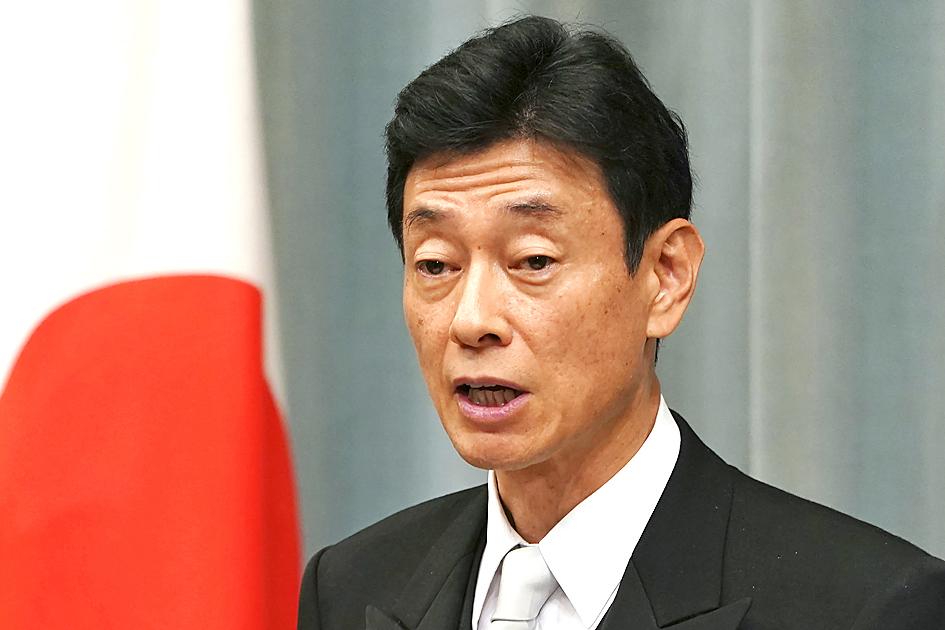Japan yesterday welcomed Taiwan’s application to join a trans-Pacific trade pact, citing shared democratic values.
Japanese officials’ appreciation of Taiwan’s values with regard to democracy and rule of law contrasted with Tokyo’s cautious reaction to China’s bid to join the Comprehensive and Progressive Agreement for Trans-Pacific Partnership (CPTPP).
“We consider Taiwan a very important partner with which we share fundamental values such as freedom, democracy, basic human rights and rule of law,” Japanese Minister for Economic and Fiscal Policy Yasutoshi Nishimura told a news conference.

Photo: AP
Japan is chairing the pact this year.
After Taiwan made the application on Wednesday, the Chinese Ministry of Foreign Affairs said it opposed Taiwan “entering into any official treaty or organization.”
In Taipei, the Ministry of Foreign Affairs said: “The Chinese government only wants to bully Taiwan in the international community, and is the arch criminal in increased hostility across the Taiwan Strait,” it said.
China is not a member of the CPTPP and its trade system has been widely questioned globally for not meeting the high standards of the bloc, it said.
President Tsai Ing-wen (蔡英文) said tech powerhouse Taiwan is well-prepared to join the bloc.
“Joining CPTPP will strengthen Taiwan’s key global strategic and economic and trade status, and further integrate us with the world,” Tsai said in Keelung yesterday.
While Japan said Taiwan’s application would need to be scrutinized against the trade pact’s strict standards, the positive reaction stood in contrast to a cautious response to China’s application on Thursday last week.
Japanese Deputy Prime Minister Taro Aso expressed skepticism about China’s chances, citing strict rules related to state-owned enterprises.
Japanese Chief Cabinet Secretary Katsunobu Kato yesterday sidestepped a reporter’s question about the different reactions to the applications, declining to go into specifics on Japan’s position on China, but referring to values shared with Taiwan.
Kato added that under the trade pact’s rules, membership was open to Taiwan, adding that it was already an independent member of the WTO and APEC.
All four candidates to become Japan’s next prime minister yesterday also expressed uniform support for Taiwan’s bid.
During a debate broadcast online, one of the candidates, former minister of foreign affairs Fumio Kishida, “welcomed” Taiwan’s application, saying Japan and Taiwan share values such as human rights.
Japanese Minister of Administrative Reform and Regulatory Reform Taro Kono also said he supported Taiwan’s participation in the WHO.
“Considering economic exchanges between Japan and Taiwan, I think it is a very happy thing that Taiwan will join after passing TPP’s [Trans-Pacific Pact’s] high standard. Definitely, I would like to support,” Kono said.

A magnitude 5.6 earthquake struck off the coast of Yilan County at 12:37pm today, with clear shaking felt across much of northern Taiwan. There were no immediate reports of damage. The epicenter of the quake was 16.9km east-southeast of Yilan County Hall offshore at a depth of 66.8km, Central Weather Administration (CWA) data showed. The maximum intensity registered at a 4 in Yilan County’s Nanao Township (南澳) on Taiwan’s seven-tier scale. Other parts of Yilan, as well as certain areas of Hualien County, Taipei, New Taipei City, Taoyuan, Hsinchu County, Taichung and Miaoli County, recorded intensities of 3. Residents of Yilan County and Taipei received

Taiwan has secured another breakthrough in fruit exports, with jujubes, dragon fruit and lychees approved for shipment to the EU, the Ministry of Agriculture said yesterday. The Animal and Plant Health Inspection Agency on Thursday received formal notification of the approval from the EU, the ministry said, adding that the decision was expected to expand Taiwanese fruit producers’ access to high-end European markets. Taiwan exported 126 tonnes of lychees last year, valued at US$1.48 million, with Japan accounting for 102 tonnes. Other export destinations included New Zealand, Hong Kong, the US and Australia, ministry data showed. Jujube exports totaled 103 tonnes, valued at

TRUST: The KMT said it respected the US’ timing and considerations, and hoped it would continue to honor its commitments to helping Taiwan bolster its defenses and deterrence US President Donald Trump is delaying a multibillion-dollar arms sale to Taiwan to ensure his visit to Beijing is successful, a New York Times report said. The weapons sales package has stalled in the US Department of State, the report said, citing US officials it did not identify. The White House has told agencies not to push forward ahead of Trump’s meeting with Chinese President Xi Jinping (習近平), it said. The two last month held a phone call to discuss trade and geopolitical flashpoints ahead of the summit. Xi raised the Taiwan issue and urged the US to handle arms sales to

BIG SPENDERS: Foreign investors bought the most Taiwan equities since 2005, signaling confidence that an AI boom would continue to benefit chipmakers Taiwan Semiconductor Manufacturing Co’s (TSMC, 台積電) market capitalization swelled to US$2 trillion for the first time following a 4.25 percent rally in its American depositary receipts (ADR) overnight, putting the world’s biggest contract chipmaker sixth on the list of the world’s biggest companies by market capitalization, just behind Amazon.com Inc. The site CompaniesMarketcap.com ranked TSMC ahead of Saudi Aramco and Meta Platforms Inc. The Taiwanese company’s ADRs on Tuesday surged to US$385.75 on the New York Stock Exchange, as strong demand for artificial intelligence (AI) applications led to chip supply constraints and boost revenue growth to record-breaking levels. Each TSMC ADR represents